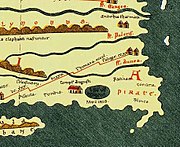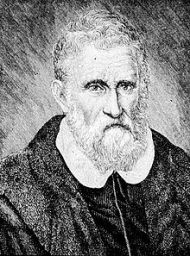“There are in these parts among the Pagans a class of men called Brahmins. They are as perverse and wicked a set as can anywhere be found, and to whom applies the Psalm which says: ‘From an unholy race, and wicked and crafty men, deliver me, Lord.’ If it were not for the Brahmins, we should have all the heathens embracing our faith.” – Francis Xavier

Oh Thomas! No Thomas!
› Every man prefers belief to the exercise of judgement. — Seneca
› To teach superstition as truth is a most terrible thing. — Hypatia
› Every formula of every religion has in this age of reason, to submit to the acid test of reason and universal justice if it is to ask for universal assent. — M. K. Gandhi
› The world has produced three great impostors: Moses, Jesus and Muhammad. — Frederick II of Sicily
› What have been Christianity’s fruits? Superstition, bigotry, and persecution. — James Madison
› Generally speaking the men who have written on India were a set of liars. — Strabo
› What India gives us about Christianity in its midst is indeed nothing but pure fables. — Alphonse Mingana
› The oriental ubiquity of St. Thomas’s apostolate is explained by the fact that the geographical term ‘India’ included the lands washed by the Indian Ocean as far as the China Sea in the east and the Arabian peninsula, Ethiopia, and the African coast in the west. — Leonardo Olschki
› The Nestorians of India venerated St. Thomas as the patron of Asiatic Christianity—mark, not of Indian Christianity. — Leonardo Olschki
› Christians must acknowledge the historical fact that from Bethlehem to Madras, most of their sacred sites are booty won in campaigns of fraud and destruction. — Koenraad Elst
› If we extend unlimited tolerance even to those who are intolerant, if we are not prepared to defend a tolerant society against the onslaught of the intolerant, then the tolerant will be destroyed, and tolerance with them. — Karl Popper
Judas Didymus Thomas the Apostle of the East

Did Christianity arrive in India before Europe?
India’s political leaders are fond of telling their constituents and the nation that Christianity arrived in India before it arrived in Europe. This historical conceit is simply not true. In Acts 19:21 Apostle Paul records his travels through Ephesus and Greece—Achaia and Macedonia—en route to Jerusalem, then on to Rome. In Romans 15:24 & 15:28 he says that he plans to visit Spain. These journeys took place in the 40s CE—some historians say he was writing after 44 CE. So even if it was true that Apostle Thomas landed in Kerala in 52 CE—the spurious date is of 19th century origin—Christianity would still have arrived in Europe a decade earlier.
Knai Thoma or Thomas of Cana aka The Merchant

Bishop Joseph of Edessa

Who are the ‘St. Thomas Christians’ of India?
Thomas of Cana, also known as Knai Thoma, led the first group of 72 Syrian Christian families to India in AD 345. There is no record of Christian communities in India prior to this date. Thomas of Cana and his companion Bishop Joseph of Edessa also brought with them the tradition of St. Thomas the Apostle of the East. Later, Christian communities in Kerala would identify Knai Thoma with Mar Thoma—Thomas of Cana with Thomas the Apostle—and claim St. Thomas had arrived in Kerala in AD 52 and established the first Christian church at Musiris—ancient port near present day Kodungallur—the main trading port of the time.
The Rev. Dr. G. Milne Rae of the Madras Christian College, in The Syrian Church in India, did not allow that St. Thomas came further east than Afghanistan. He told the Syrian Christians that they reasoned fallaciously about their identity and wove a fictitious story of their origin. Their claim that they were called ‘St. Thomas’ Christians from the 1st century was also false.
Syrian Christians were called Nasranis (from Nazarean) or Nestorians (by Europeans) up to the 14th century. Bishop Giovanni dei Marignolli the Franciscan papal legate in Quilon invented the appellation ‘St. Thomas Christians’ in 1348 to distinguish his Syrian Christian converts from the low-caste Hindu converts in his congregation.
San Tommaso Cathedral Basilica, Ortona, Italy

The real tomb of Saint Thomas at Ortona, Italy

The bones of Thomas the Apostle at Ortona, Italy

San Thome Cathedral, Mylapore, Madras, India

First St. Thomas Church in Mylapore built 1523
San Thome Cathedral, Mylapore, Madras, was built in 1893 in Gothic style by the British. The first St. Thomas church to appear on the Mylapore beach was built in 1523 by Portuguese pirates and Augustinian friars against the ancient Kapaleeswara Temple wall. The Christian tactic of encroaching on Hindu buildings and holy sites and then taking them over continues in Tamil Nadu till today.
Diorama in the fake St. Thomas tomb at San Thome Cathedral

Idol on the empty tomb in San Thome Cathedral

Church on St. Thomas Mount replaces an ancient Shiva temple

Ancient Port of Muchiri / Muziris on a Roman map

‘India’ was a synonym for all Asia in ancient times
The oriental ubiquity of St. Thomas’s apostolate is explained by the fact that the geographical term ‘India’ included, apart from the subcontinent of this name, the lands washed by the Indian Ocean as far as the China Sea in the east and the Arabian peninsula, Ethiopia, and the African coast in the west.
Ancient writers used the designation ‘India’ for all countries south and east of the Roman Empire’s frontiers. India included Ethiopia, Arabia Felix, Edessa in Syria (in the Latin version of the Syriac Diatessaron), Arachosia and Gandhara (Afghanistan and Pakistan), and many countries up to the China Sea.
In the Acts of Thomas, the original key text to identify St. Thomas with India (which all other India references follow), historians agree that the term India refers to Parthia (Persia) and Gandhara (Pakistan). The city of Andropolis named in the Acts, where Judas Thomas and Abbanes landed in India, has been identified as Sandaruck, one of the ancient Alexandrias, in Baluchistan.
Was Jesus really born?

The Holy Foreskin

Public Folders
National Shame!

Read This Book!












Thus Spoke Francis Xavier
In his letters to the Jesuits in Rome, Xavier wrote: “There are in these parts among the pagans a class of men called Brahmins. They are as perverse and wicked a set as can anywhere be found, and to whom applies the Psalm which says: ‘From an unholy race, and wicked and crafty men, deliver me, Lord.’ If it were not for the Brahmins, we should have all the heathens embracing our faith.”
“Following the baptisms, the new Christians return to their homes and come back with their wives and families to be in their turn also prepared for baptism. After all have been baptised, I order that everywhere the temples of the false gods be pulled down and idols broken. I know not how to describe in words the joy I feel before the spectacle of pulling down and destroying the idols by the very people who formerly worshipped them.” Xavier did this after the Hindu Raja of Quilon had given him a large grant to build churches!
On baptising and inducting children into Christianity, he wrote in 1543 to the Society of Jesus in Rome: “These children, I trust heartily, by the grace of God, will be much better than their fathers. They show an ardent love for the Divine law, and an extraordinary zeal for learning our holy religion and imparting it to others. Their hatred for idolatry is marvellous. They get into feuds with the heathen about it, and whenever their own parents practise it, they reproach them and come off to tell me at once. Whenever I hear of any act of idolatrous worship, I go to the place with a large band of these children, who very soon load the devil with a greater amount of insult and abuse than he has lately received of honor and worship from their parents, relations, and acquaintances. The children run at the idols, upset them, dash them down, break them to pieces, spit on them, trample on them, kick them about, and in short heap on them every possible outrage.”
Xavier’s letter demanding the Inquisition be sent to Goa
Francis Xavier sent this letter to King John III of Portugal on May 16th, 1545: “The second necessity for the Christians is that your Majesty establish the Holy Inquisition, because there are many who live according to the Jewish law, and according to the Mahomedan sect, without any fear of God or shame of the world. And since there are many spread all over the fortresses, there is the need of the Holy Inquisition and of many preachers. Your Majesty should provide such necessary things for your loyal and faithful subjects in India.” – Joseph Wicki, Documenta Indica, Vol. IV, Rome, 1956.
The Inquisition in Goa
Historian Paul Roberts describes what went on in the Inquisition’s Goa court that had been housed in the Sultan’s old palace and had a huge plaster image of Christ overlooking the scene: “Children were flogged and slowly dismembered in front of their parents, whose eyelids had been sliced off to make sure they missed nothing. Extremities were amputated carefully, so that a person could remain conscious even when all that remained was a torso and head. Male genitals were removed and burned in front of wives, breasts hacked off and vaginas penetrated by swords while husbands were forced to watch…. And it went on for two hundred years.” – Paul Williams Roberts, The Empire of the Soul: Some Journeys in India, New York, 1997.
Anti-Brahminism
Francis Xavier was the pioneer of anti-Brahmanism which was adopted in due course as a major plank in the missionary propaganda by all Christian denominations. Lord Minto, Governor General of India from 1807 to 1812, submitted a Note to his superiors in London when the British Parliament was debating whether missionaries should be permitted in East India Company’s domain under the Charter of 1813. He enclosed with his Note some “propaganda material used by the missionaries” and, referring to one missionary tract in particular, wrote: “The remainder of this tract seems to aim principally at a general massacre of the Brahmanas.” (M. D. David (ed.), Western Colonialism in Asia and Christianity, Bombay, 1988, p. 85). – Koenraad Elst, Indigenous Indians: Agastya to Ambedkar, Voice of India, New Delhi, 1993.
St. Francis Xavier on child care
Readers might be interested in Xavier’s innovations in day care, that so captured the imagination of the doctors of the Mother Church who so fondly and gently “suffers the little ones to come unto her,” that he was canonised:
Perhaps I didn’t read carefully enough, but Shri Goel seems to have missed this rather instructive, nay revelatory, piece in his book “Francis Xavier SJ.” It gives an entirely new twist to what is arguably the rage in our nursery schools: “Learning by doing.” – KS
Reference
1. St. Francis Xavier: Letter from India to the Society of Jesus at Rome, 1543